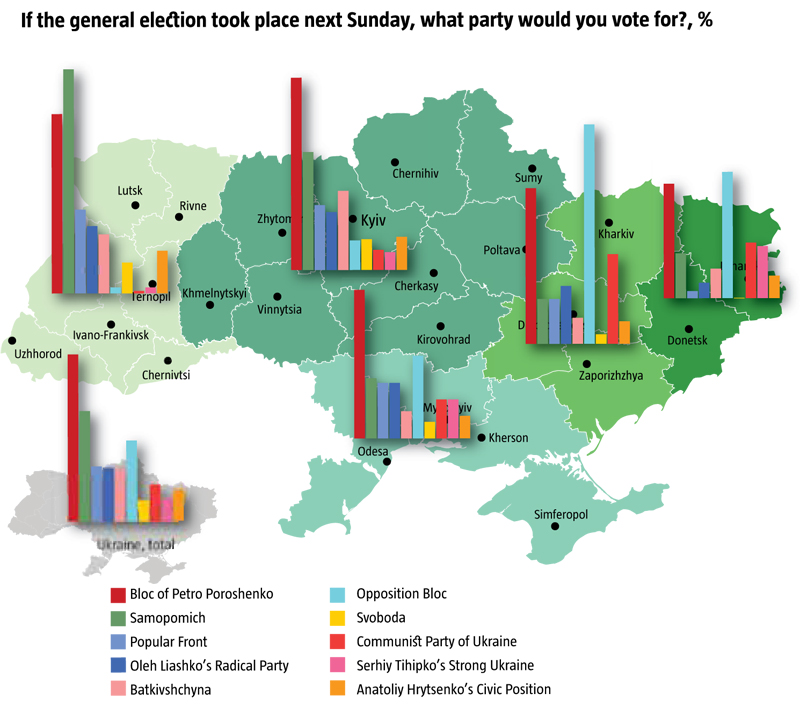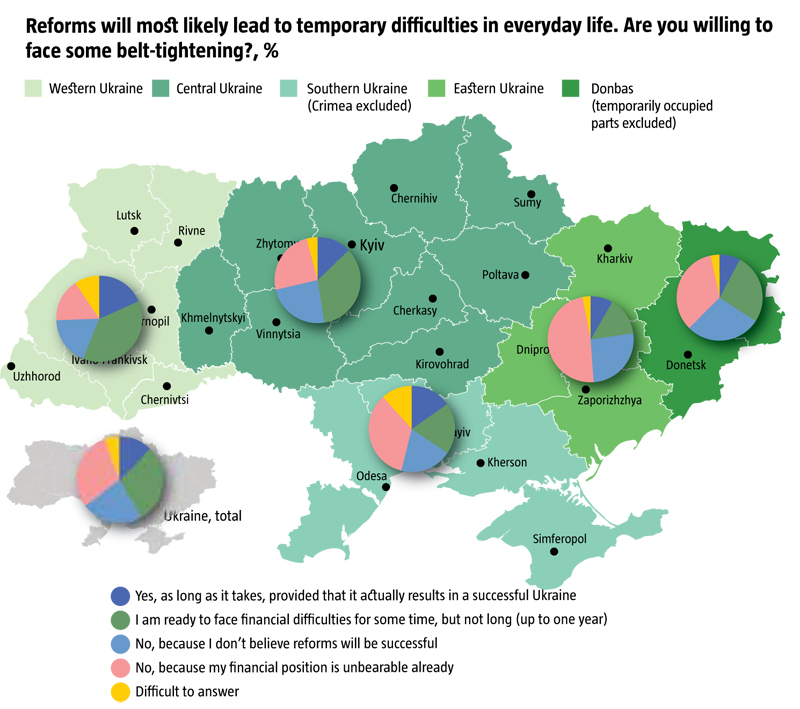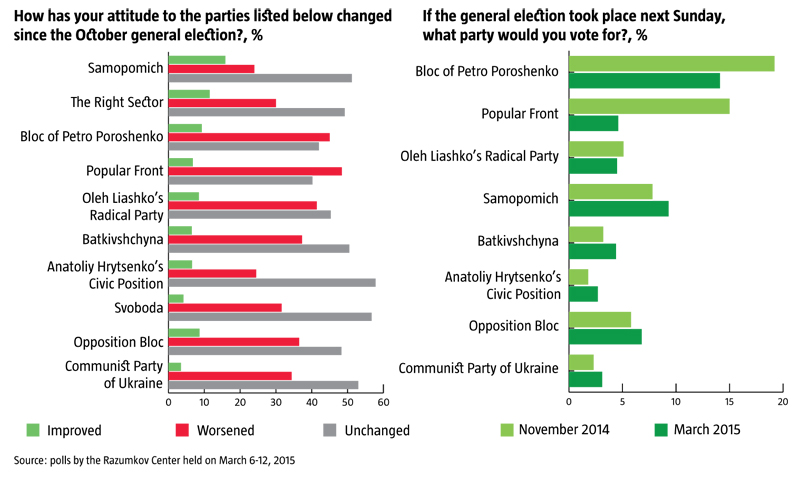As the fighting in the Donbas seems to have subdued slightly, this spring brings once again to the forefront the political tensions within the ruling coalition. In March, Yulia Tymoshenko's Batkivshchyna and Oleh Liashko’s Radical Party threatened to leave it, refusing to vote for the bills necessary to get IMF loans and to implement the Minsk agreements. Samopomich party also excelled in selective and unpredictable voting on the coalition bills.
The President’s conflict with Ihor Kolomoisky and offensive against the interests of Dmytro Firtash and Rinat Akhmetov in sectors that they traditionally believed to be their own fiefdoms urged them to engage in politics more actively. In April, internal squabbles reached a new level: the Batkivshchyna party rushed full tilt into the coal-and-coalminers conflict and joined the chorus of accusations of the inflated new tariffs for housing and communal services. Anton Herashchenko, advisor to Interior Minister Arsen Avakov, demanded that the head of Donetsk Oblast State Administration Oleksandr Kikhtenko, who has long lobbied for lifting the blockade of the Russian-occupied regions of the Donbass, be dismissed.
However, the climax of the confrontation was a high-profile corruption scandal with the alleged involvement of the government in general and Premier Arseniy Yatsenyuk in particular, amounting to billions of hryvnyas. The key role in the attack on the Prime Minister was played by the members of the Batkivshchyna party, his former partners in the alliance that his own political force, the Front of Change, once formed with Tymoshenko's party. The accusations were supported by the members of Svoboda party, as well as by Liashko's Radical Party and UDAR’s Serhiy Kaplin, who are allegedly linked to Serhiy Lyovochkin, former head of Viktor Yanukovych's Administration and current leader of the Opposition Bloc. Yatseniuk’s Popular Front then started publicly accusing Batkivshchyna and its other critics of being Putin’s agents who are implementing Moscow-written scenarios to destabilize the situation in Ukraine.
RELATED ARTICLE: How and when Ukraine's Ancien Regime is likely to strike back
For the moment, the attack on Premier Yatseniuk was bogged down primarily due to the fact that the Bloc of Petro Poroshenko (BPP) and his Presidential Administration realize far too well that they are in the "same boat" with Yatseniuk's Popular Front, and the collapse of the coalition and political instability would play against the government and the country in general. The Premier is primarily blamed for the negative implications of the belt-tightening policy, but the President and his political muscle have not escaped criticism either. For instance, according to the public opinion poll conducted in March by the Rozumkov Centre, Yatseniuk's performance were fully supported by only 7.8% of Ukrainians and Poroshenko's by 12.6%, while some individual moves of the Premier were supported by 29.3%, and of the President by 40.7% of Ukrainians. 56.7% of respondents did not support the initiatives of the Premier, and 39.9% of the President.
 Another sign of the heated conflict within the coalition was the confrontation around the coal industry reform, leading to a de facto ad hoc alliance formed by the Batkivshchyna party and the Opposition Bloc. The Independent Trade Union of Miners headed by Yulia Tymoshenko's long-time ally Mykhaylo Volynets and the Trade Union of Mine Workers led by a former Party of Regions MP Viktor Turmanov, in fact, stood together against the government's attempts to restructure the coal mining industry by canceling state subsidies to loss-making coal enterprises and closing unprofitable mines. It is important to note that Deputy Energy Minister in charge of the coal sector was appointed from Batkivshchyna's quota.
Another sign of the heated conflict within the coalition was the confrontation around the coal industry reform, leading to a de facto ad hoc alliance formed by the Batkivshchyna party and the Opposition Bloc. The Independent Trade Union of Miners headed by Yulia Tymoshenko's long-time ally Mykhaylo Volynets and the Trade Union of Mine Workers led by a former Party of Regions MP Viktor Turmanov, in fact, stood together against the government's attempts to restructure the coal mining industry by canceling state subsidies to loss-making coal enterprises and closing unprofitable mines. It is important to note that Deputy Energy Minister in charge of the coal sector was appointed from Batkivshchyna's quota.
As Ukrainians grow weary of deteriorating living standards and slow reforms, populism and the ability to dissociate from the government's actions in the eyes of the voters brings good electoral results.
According to the above survey of the Razumkov Centre, as of March 2015, the share of the population willing to vote for the BPP decreased compared to November 2014 from 19.2% to 14.1%, and for the Popular Front, from 15.0% to 4.6%. Only 6.8% of the respondents improved their opinion of the Popular Front, 8.5% – of the Radical Party, 9.3% – of the BPP, and 15.9% – of Samopomich. The attitude of 48%, 41.4%, 45% and 24% of the respondents, respectively, changed for the worse. That is, more positive dynamics are clearly visible for the coalition’s minority stakeholders by contrast to the President's and Premier's political forces, which, with a little helping hand from their coalition partners, are being made accountable for all negative aspects of the situation in the country. For Batkivshchyna, 6.5% of respondents improved their perception of the party, 37.3% changed their opinion for the worse, while more than 50% did not change it.
RELATED ARTICLE: Vytautas Landsbergis: "Ukrainians are now undergoing a long endurance test"
Thus, a de facto opposition has emerged within the formal coalition in the Rada. On the one hand, its representatives, with rare exceptions, are unable to influence the government's decisions. Therefore, they have to either support the initiatives of the Popular Front and BPP as the coalition’s majority stakeholders, or to oppose them, but this has little effect on the outcome of the votes. On the other hand, Batkivshchyna, Radical Party and Samopomich have a chance to publicly criticize the actions of the government and the President, taking the opposition niche in the eyes of the voters.
Tired of austerity
Being seen as opposition can be very helpful in times of rapid socio-economic degradation with real reforms barely there. The cost of living, even according to the official figures, has grown 1.5 times over the last year (according to the State Statistics Agency, price increase from March 2014 to March 2015 was 45.8%), while nominal income of the Ukrainians remained the same. In April, the government dared to take the long-needed steps to raise public utilities tariffs to economically justified levels.
According to the March survey conducted by the Razumkov Centre, the share of citizens who believed that the situation in the country is going in the right direction (17.5%) nearly halved compared to 32.3% in March 2014, immediately after the Maidan. Only 21.8% of the respondents believed that Ukraine is capable of overcoming the existing problems within the next few years, while 30.7% expected a total social and economic collapse in the near future.
In the South and East, this figure is close to 50% (East – 46.1%, Ukrainian-controlled part of the Donbas – 43%, South – 38.9%). In the Centre and West, the share of the respondents who stated that the situation in the country is developing properly was much larger. The results of a poll conducted in early March by the Kyiv Intrnational Institute of Sociology confirmed that people in the West and Centre assessed Ukraine’s mid-term prospects more optimistically: 52.5% and 50.6% expected improvements while 17.6% and 19.4% believed the situation would deteriorate.
RELATED ARTICLE: Why de-oligarchization is stumbling
 According to the March data collected by the Razumkov Centre, today only 12.7% of Ukraine's population are "ready to sacrifice whatever it takes if this can result in the country's success," 28.7% are "ready to suffer for a short while, but not for long (not more than a year)," and 53% are not ready to suffer because they either do not believe in the success of the reforms or their financial situation is already intolerable. In the Western region, the total number of those ready to suffer at least for some time exceeds the number of those who aren’t (56.2% vs 34.5%, respectively), while in the Centre these figures are almost equal (47.7% vs 48.2%, respectively).
According to the March data collected by the Razumkov Centre, today only 12.7% of Ukraine's population are "ready to sacrifice whatever it takes if this can result in the country's success," 28.7% are "ready to suffer for a short while, but not for long (not more than a year)," and 53% are not ready to suffer because they either do not believe in the success of the reforms or their financial situation is already intolerable. In the Western region, the total number of those ready to suffer at least for some time exceeds the number of those who aren’t (56.2% vs 34.5%, respectively), while in the Centre these figures are almost equal (47.7% vs 48.2%, respectively).
However, high levels of optimism about the country's prospects of changes for the better and the consequent willingness to endure hardships for some time, which can be observed in the West and Centre, are no less dangerous. Failure to meet the voters' expectations will lead to bitter disappointment, apathy and growing protest sentiments, not necessarily the constructive ones, that can be used through political manipulations by anti-Ukraine forces to destabilize the country.
Waiting for the elections
The formula of today's broad coalition was initially just a ritual tribute to Euromaidan. The public expected all the political forces that supported democracy and European choice to unite in a coalition following the victory of the Maidan. However, the resulting constitutional majority allowed provided ample opportunities to its stakeholders to ignore not only fellow party members, but also entire partner factions, wage internal wars, shift responsibility to the coalition partners and grab the neighbor's piece of the electoral pie.
More than 300 seats held by the five coalition factions, plus Ihor Yeremeyev's group of MPs actually associated with the majority, exceeded by almost 100 votes the quorum necessary to pass the Parliament's bills. A number of key decisions were passed by 227-230 votes, 15-20 out of which belonged to MPs that formally were not part of the coalition. This allowed it to keep ignoring the lack of consensus among its members when making difficult decisions and not to notice the resistance of the above mentioned "minority stakeholders."
With the current majority configuration, the opposition niche has actually been left to the reactionary Opposition Bloc. However, Ukraine would benefit much more from an opposition initially formed of democratic, pro-European political forces that would oppose the majority only in matters pertaining to the tactics of the European reform course. This would have made the implementation of the EU integration and the necessary reforms the main focus of the political struggle in the country, rather than questioning whether to continue down the chosen path, as the Opposition Bloc does. Leaving the opposition niche to it basically helps promote it, giving it the opportunity to claim being the only alternative to the entire pro-European political camp.
RELATED ARTICLE: Reforms of electoral law as a key to transforming Ukraine
The situation will escalate further as Ukraine enters the season of local elections. Even if they are not accompanied by early parliamentary elections, the local ones will still be a very important indicator of change in political preferences. Another important question is how the protest votes will be distributed: how many will go to the pro-European opposition, including new political projects, and how many will be given to reactionary projects, primarily, the Opposition Bloc.
Whoever wins the local elections will get engaged in the fight for early parliamentary and, possibly, presidential elections in a longer run. Besides, local elections on their own will be very important. Decentralization is very likely to ultimately take place under the pressure from both internal and external sources, thus significantly increasing the authority of local governments and whoever controls them. The newly elected local governments may turn out to be much more ambitious in trying to influence the state policy than the current ones that were formed five years ago basing on the results of the 2010 elections largely rigged by the Yanukovych regime.

The data of the recent polls indicate that the BPP is still the most popular political force in the Centre and West, with support figures in the South approaching the average across Ukraine. The situation is similar for the Popular Front, except that in the South and East it has significantly lower support rates compared to the average. Samopomich already today enjoys electoral sympathies at the same level as the BPP in the West, where it will soon be able to come out on top. At the same time, its support in the Centre of the country is equally high, while in the South and East it is popular enough to overcome the electoral threshold in local elections. The Popular Front, on the contrary, has no such chances in the South and East.
Batkivshchyna's support are higher than average in the South and Center, as well as in the West. However, its popularity is not sufficient to get into local governments, both in the East and in the Donbas. Oleh Liashko's Radical Party has a good chance of entering local governments all over the country, enjoying the highest popularity in Western and Central Ukraine. In the West and Center, Anatoliy Hrytsenko's Civic Position has rather high chances of getting into the local governmens, while the Right Sector stands good chances in all regions, except for the East and the Donbas. Svoboda, however, today has a chance to enter local authorities only in Western Ukraine and in some areas of Central Ukraine.
RELATED ARTICLE: The weak points of the parliamentary majority
The Opposition Bloc currently has no prospects to enter local governments on party lists in the Center and West. However, they could remedy the situation by sending their well disguised candidates to first-past-the-post constituencies, who could end up making their way into local governments in other regions as well. Besides, its members could run in local elections in different regions under the disguise of several new parties with neutral names. At any rate, it is an uncontested leader in the Donbas and in the East, also having considerable support in the South.
Uncommitted resources
The situation remains utterly uncertain in Southern and Eastern Ukraine, where the majority of the population are still hesitating or have no intentions of going to the polls. In the Donbas and South, about 50% of respondents are either not planning to vote at all or have not yet finalized their sympathies, for various reasons.
KIIS survey results show that the South and East are no longer pro-Russian, but have remained Eurosceptical. According to the poll, 32.2% of the population in Southern Ukraine support joining the EU, 31.4% support joining neither the EU, nor the Customs Union, and 21.8% support joining the Customs Union. In the East, these figures are 32.2%, 32.7% and 19%, respectively, and 28.5%, 28.5% and 23.6% respectively in the Donbas.
The respondents are rather indifferent with respect to internal polarization of Ukrainian society. For example, when asked about whom they would support if the Maidan were taking place today by the Razumkov Centre, 25.4% of respondents in Eastern Ukraine supported Maidan, 21.1% supported Antimaidan and 41.9% were against both, while in the South these figures were 23.1%, 10.6% and 52.8%, and in Ukrainian-controlled Donbas, 19.6%, 10.1% and 63.6%, respectively. This creates a favorable environment for promoting new "centrist" political projects and self-nominated candidates for first-past-the-post constituencies.
RELATED ARTICLE: Russian-speaking regions: myths and reality
Local elections are a real chance to secure, consolidate and even extend their influence in Southern and Eastern Ukraine for Rinat Akhmetov’s group, thus increasing its weight in political bargaining with the President and the ruling coalition in the Rada, especially in light of the potential parliamentary and presidential elections. The same goes for the Dnipropetrovsk-based Ihor Kolomoisky, for whom winning the local elections would mean a chance to translate his increased influence into control of the lower echelons of power.

